10 years of curating the best writing tools 👉loreteller.com
Don't wanna be here? Send us removal request.
Text
Hope is a tool of the oppressor. Hope means waiting, and time is always on the side of power.
Hope is a shield for the oppressed. Hope means persisting, and time is always on the side of those who resist.
Which is more true?
3 notes
·
View notes
Text
The Hidden Trinity of Self: Unblemished, Unmeasurable, Unfinished
The question “who can I be?” is too often replaced with “who am I?”
I live in a world that unrelentingly demands that I explain myself. It demands that I justify my existence, and the rubric for a justified existence is told to me in a hundred contrary ways by a thousand contrary forces. The deep work of getting better is overshadowed by the pressure to be the best right now.
The world demands that I present myself as digestible and distinct: a neatly packaged product for others to select, read the label on the back, and put in their shopping cart. We do this to ourselves too. We are so perpetually confounded at the complexity of the human experience, and our brains want nothing more than the comfort of boundaries and boxes. We divide our world into the haves and the have-nots, the capable and the hopeless, the flawless and the degenerates, the star-bellied sneetches and the starless ingrates.
There are three aspects to every person, at their core. Three aspects that we lose sight of. By awakening to the truth of what we really are, we can find peace in a world that fragments us to bore scrutiny into each part.
I am not inherently broken. I cannot be defined by labels. I have not arrived at my destination.
Beyond any superficial construct, our true selves are unblemished, unmeasurable, and unfinished.
Unblemished: Embracing Our Intrinsic Worth
No one is perfect. But the idea of being unblemished is not synonymous with the illusion of perfection: it is the realization that my intrinsic worth is untouched by my experiences. No trauma, choice, or assailant can reach its shadowy hand into my soul and leave it corrupted, or poisoned. My value defies obstacle and judgement. It is an unwavering facet of my essence.
The world wants to remind my of my inadequacy. But I am not broken, nor am I defined by my mistakes. My innate worth is untouchable. I am unblemished.
Unmeasurable: The Depth of Identity Beyond Convention
No one can float through life, avoiding all attachment, belonging, or label. And indeed, it would be harmful to do so. We attach ourselves to categories and groups, choosing our soil and planting our roots. But the concept of being unmeasurable transcends the futile attempt to quantify or categorize our identities. It is the understanding that my true self is beyond the reach of labels, and that I am more than my occupation, my relationships, or the expectations others have for me. My identity is an intricate tapestry of ever-evolving layers and hues, too rich and vibrant to be contained within a set of descriptions. I engage with the labels as a useful tool to navigate the world, knowing that models are just as false as they are helpful.
The world tries to bind me within its narrow definitions. But I am not confined, nor am I constrained by the labels others attach to me. My identity is vast and unbounded. I am unmeasurable.
Unfinished: The Perpetual Odyssey of Growth
The absence of a finish line doesn’t make the race a pointless one. The notion of being unfinished is not the admission of inadequacy: it is the recognition that my journey of self-discovery is ceaseless, an ongoing odyssey of growth and transformation. Embracing this understanding liberates me from the illusion of finality, igniting within me an unquenchable curiosity for the world and a boundless desire to expand my horizons.
The world seeks to convince me that I should achieve a zenith, that I should yearn for the moment that there is nothing left to learn or explore. But I am not stagnant, nor am I limited by my current state. My potential for growth is infinite. I am unfinished.
By acknowledging and embracing the unblemished, unmeasurable, and unfinished aspects of our true selves, we can hold space for the constructs of society without being consumed by them.
Our unblemished nature reminds us of our inherent worth, our unmeasurable essence transcends limitations, and our unfinished state encourages continuous growth. By embracing this hidden trinity, we not only honor our own complexity and depth but also cultivate empathy and understanding for the diverse, ever-evolving tapestry of human experience.
---
Liked this? Read more essays on storytelling and narrative psychology at https://loreteller.substack.com
2 notes
·
View notes
Text
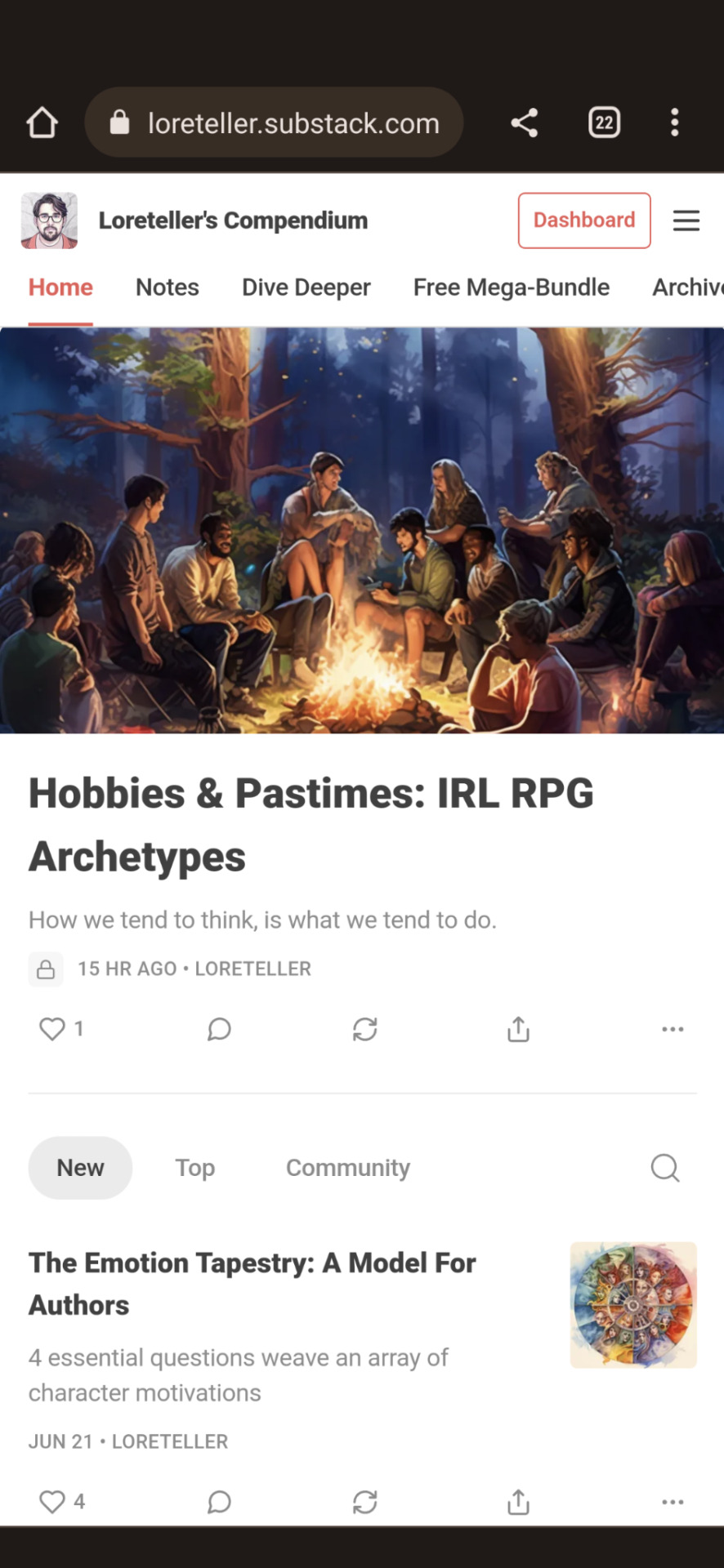
Like what you see?
Subscribe to Loreteller's Compendium, and get excellent essays in your inbox every Monday morning.
https://loreteller.substack.com
Still not sure? Here's a preview of the upcoming essays!
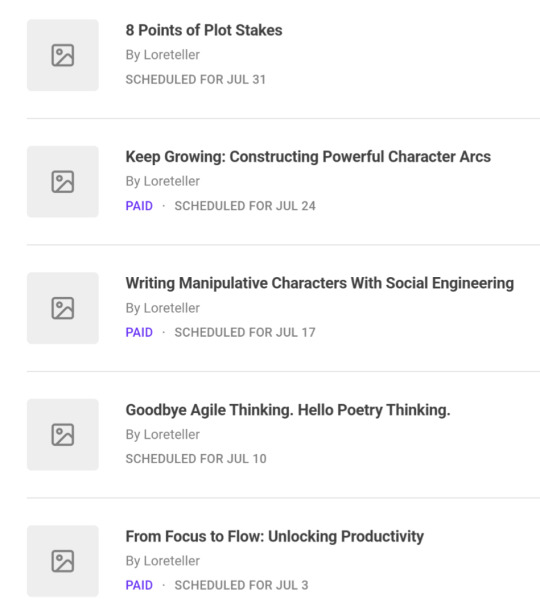
#substack#resources#character writing#writing advice#worldbuilding#writing tips#writing help#writers#fantasy writing#writing
23 notes
·
View notes
Text
Designing fantasy world maps is hard. But it doesn't have to be.
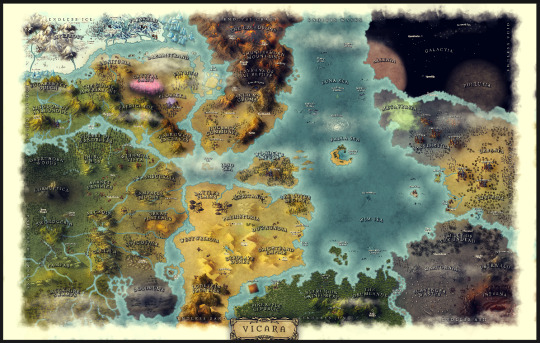
I have mastered this map aesthetic in Inkarnate, and I want to teach you EXACTLY how to replicate it.
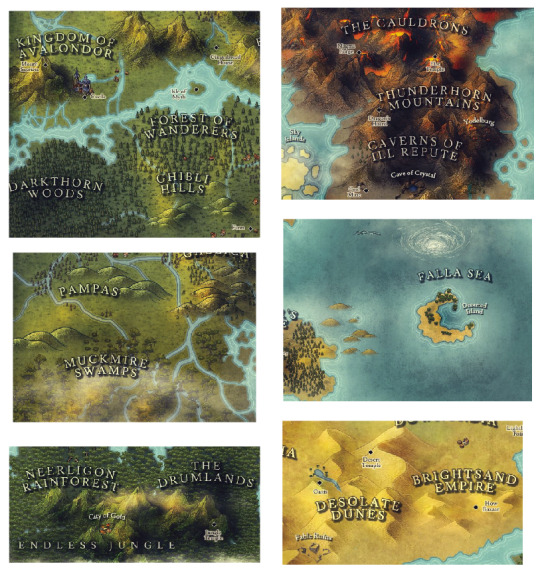
A video is worth a thousand pictures, so check out this overview of my process:
In my full guide, you'll find tutorials like this:
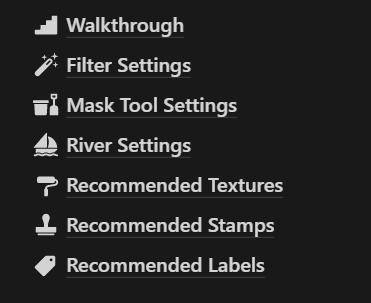
Grab my full guide now!
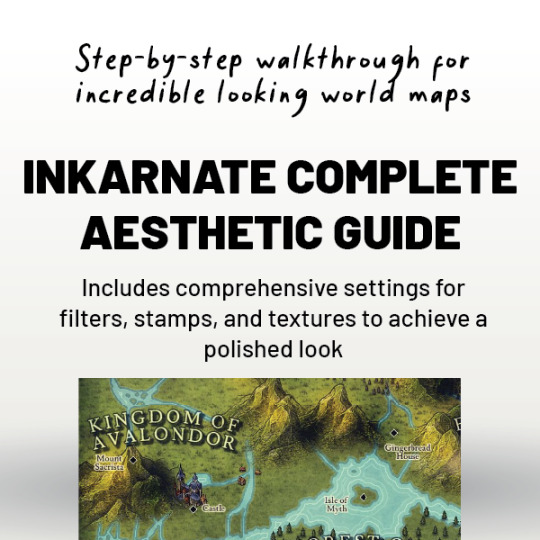
https://ko-fi.com/s/2852286e5b
• • • • • •
I'm Loreteller, and I help storytellers tell better stories.
Get 50+ Free Storytelling Resources
Check out the Premium Resources
Watch the TikTok
Join the Discord
See all my links
Support me on Ko-Fi
44 notes
·
View notes
Text
reasons why writers should buy my character sheet:
It's incredibly useful
It's built by a psych nerd with over a decade of experience
If 2 people buy it I can get 4 chicken sandwiches from Wendy's

#writing advice#writing tips#character writing#litrpg#narrative psychology#worldbuilding#writing#writing help#writers#fantasy writing#reference#resources#character sheet
13 notes
·
View notes
Text
4 Styles of Self-Motivation
Understand your characters, or yourself.
In many different roles that we play in life, it can be useful to understand our own tendencies as well as those of others. It can be eye-opening to realize just how differently people can perceive the world. By being able to see things from other people's perspectives, we can better understand why, from their perspective, their actions make sense and are justified.
There are four distinct styles of self-motivation, which are as follows:
Upholders
These individuals want to know what is expected of them and will work to meet those expectations.
Questioners
These individuals want to understand the reasoning behind a proposed action and will only take the action if they feel that it is justified.
Obligers
These individuals respond well to accountability and will work to meet the expectations of others or fulfill their commitments.
Rebels
These individuals value their independence and freedom to do things their own way. They may resist rules or expectations that they feel are imposed upon them.
Let's examine them in detail.
Upholders
Tend to meet both external and internal expectations easily.
Are self-motivated and can work on projects and meet deadlines without much supervision.
Prefer routine and may have difficulty adjusting to sudden schedule changes or disruptions to their routine.
Are perfectionistic and may become angry or defensive if they are perceived to have made a mistake.
Place a high value on following through with commitments.
May need to be reminded that not everyone is comforted or energized by completing tasks in the same way they are.
May struggle with delegating responsibilities because they may doubt others' reliability.
Questioners
Only meet expectations if they believe they are justified and will question all expectations.
Place a high value on reason, research, and information.
Will only follow the advice of "authorities" if they trust their expertise.
Rely on their own judgment, even if it goes against the advice of experts.
May appear uncooperative or defiant due to their persistent questioning.
Dislike anything arbitrary and may resist rules or expectations that they see as unnecessary.
May become frustrated when they are asked to justify their decisions as they believe they have already carefully considered their actions.
May have difficulty delegating decision-making to others because they doubt their reasoning.
Obligers
Easily meet external expectations but struggle to meet internal expectations.
Place a high value on fulfilling commitments to others and may feel a strong sense of obligation to meet the needs of others.
Thrive with deadlines, oversight, monitoring, and other forms of accountability.
May find it difficult to set limits on the demands of others.
May be taken advantage of by others and may feel resentful as a result.
May have trouble delegating tasks as they feel that some expectations are their personal responsibility.
Need systems of external accountability to help them meet their own inner expectations.
Rebels
Resist both external and internal expectations.
Place a high value on freedom, choice, identity, and authenticity.
Tend to resist being told what to do and may be easily manipulated through their desire to resist authority.
May act out of love, a sense of purpose, or belief in a cause.
May have difficulty giving themselves direction, even when it is something they want to do.
May enjoy meeting a challenge in their own way and on their own time.
Generally do not respond well to supervision, advice, directions, or routines and schedules.
May suffer in highly regulated environments such as the military, law enforcement, or large corporations.
If in a long-term work or romantic relationship, their partner is likely an Obliger.
#writing advice#writing tips#character writing#litrpg#narrative psychology#worldbuilding#writing#writing help#writers#fantasy writing#reference#resources
3 notes
·
View notes
Text
Character Values Wheel
Stop creating characters without understanding their values.
As writers, it is essential to define what our characters care about. But could there be an objective and universal model of human values?
No, probably not. But, we can ask some interrogating questions.
When you strip away all construct, culture, setting, programming, and experience, what defines our motivations? How do our motivations relate to each other? All models are false, but there are various frameworks we can pull from to arrive at something useful for writing fiction.
Okay But Who Are You?
I'm a writer and I study narrative psychology. I have worked in professional marketing and branding for a decade, and have built this values model over the past 5 years, based on contemporary sociological research.
You can check out the academic sources at the bottom of the post.
Here's a peek at the model
The core of the model has Altruism-Egoism as the vertical axis, and Collectivism-Individualism as the horizontal access.
If you're a D&D player, think of this like an upgraded alignment chart.
Where these two axes intersect is the meat of the whole model. The Mastery axis and the Service axis. This emergent relationship forecasts much of the rest of the model.

The second ring shows the 8 Interpersonal Ideologies. Each one aligns to an intersection of the 8 spokes of the center wheel.
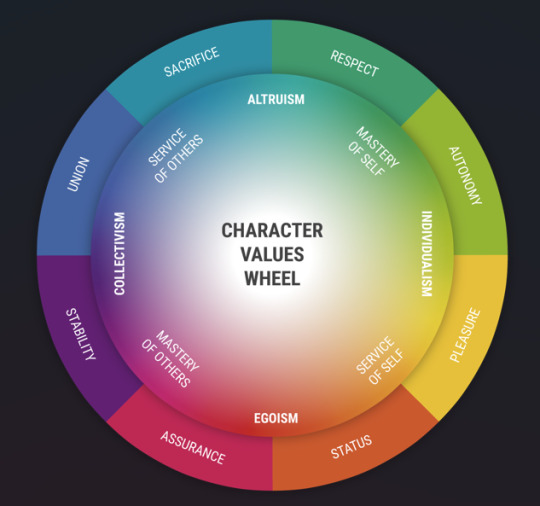
Each Ideology is divided into 3 values. For example, let's look at Autonomy. The three values are Curiosity, Creativity, Independence.

An archetype straddles two values. For example, the Inventor is Curiosity-Creativity. The Artist is Creativity-Independence.

Finally, the 8 Desires ring the outside. Each one aligns directly to a spoke on the center wheel.
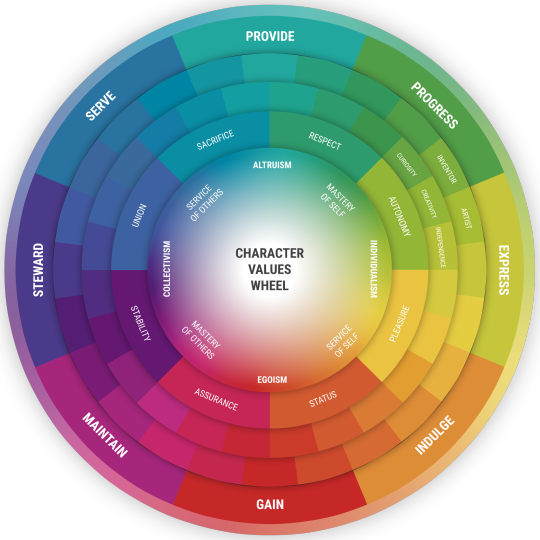
With the full model, you can not only understand your character's values better, but also contextualize them against the values of the world they live in.
I have 50+ awesome resources for free at:
I am trying to share my knowledge and pay rent at the same time, so I have 10 resources offered as a premium download on the shop.
Grab it here:
If you can't afford it, check out the free resources! If you're not interested, no worries! I'll keep sharing writing tools and advice. Thanks for reading!
Sources
Theory of Basic Human Values - Schwartz PhD
https://en.wikipedia.org/wiki/Theory_of_Basic_Human_Values
Cultural Map - Inglehart PhD, Welzel PhD
https://en.wikipedia.org/wiki/Inglehart-Welzel_cultural_map_of_the_world
Pearson-Marr Archetype Indicator - Pearson PhD
https://www.uiltexas.org/files/capitalconference/Twelve_Character_Archetypes.pdf
16 Basic Desires Theory - Steven Reiss
https://www.google.com/books/edition/Who_am_I/EbOjA5oAsEUC?hl=en
Moral Foundations Theory - Jonathan Haidt
https://en.wikipedia.org/wiki/Moral_foundations_theory
Cultural Worldviews and Political Process Preferences - Chad Zanocco
https://onlinelibrary.wiley.com/doi/10.1111/ssqu.12500
#narrative psychology#worldbuilding#character design#values#storytelling#writing advice#writing tips
353 notes
·
View notes
Text
Gatekeeping writing tools is over.
See the full list of tools and guides here: https://free.loreteller.com
#writers#worldbuilders#plotters#writing tips#mental models#narrative psychology#litrpg#map making#writers block
2 notes
·
View notes
Text
Best Worldbuilding Apps
For more writing advice, visit https://free.loreteller.com
1 note
·
View note
Text
Introducing Loreteller
Allow me to introduce this project titled "Loreteller".
I have been curating writing tools, nuggets of psychology wisdom, mental models, and story bits for the past decade. I have a background in information systems and creative writing, and have worked in branding and design for a ton of companies.
Corporate marketing psychologist by day, but a creative writer by night: I'm building an expansive world for my novels and curating these tools along the way. In fact, there's a ton of knowledge gatekept by marketers and designers regarding character psychology, compelling writing, and narrative hooks that deserves to be shared.
Loreteller is the synthesis of years of piecing together mental models, plot structures, and narrative systems. Built for brand designers, dungeon masters, marketers, novelists, and storytellers of all kinds - and I'm exciting to share it.
What if you had an encyclopedic list of every aspect of character, plot, personality, and brand?
When I first started my career as a writer, that certainly didn't exist. I hope these tools inspire your own creativity and stories.
Whether you’re a marketer by day, novelist by night, dungeon master by weekend, or all three, these tools are designed to give you the express route to making smart narrative decisions. Or at least, to think outside of the box!
Charactercrafting, storysmithing, themeweaving, worldbuilding, gameforging - there's a ton of info to benefit from, and I'll be sharing bits of it on Tumblr.
See the full list of tools and guides here: https://free.loreteller.com
Let me know if you have any questions!
541 notes
·
View notes
Text
Magic System Checklist
When designing a magic system for a fictional world, the four aspects to consider are accessibility, cost, effect, and acceptance.
Accessibility
Source: Where does the magic come from?
Rarity: Can the magic be accessed commonly, or is it rare?
Eligibility: Who can access this magic?
Acceptance
Ubiquity: How much does the average person encounter the magic in their daily life?
Taboo: What social customs or pressures are placed on using the magic?
Laws: What rules and requirements are placed on using the magic?
Cost
Resources: What does one need in order to perform the magic?
Procedure: What does one have to do physically?
Tradeoffs: What does one give up in order to do the magic?
Effect
Limitations: What are the limits of the magic power?
Consistency: Does the magic always work the same way each time?
Consequences: What dangers or benefits does the magic bring?
For this and more writing advice, visit https://free.loreteller.com
4 notes
·
View notes
Text
Light & Dark Triads
Psychologists have determined two opposing poles of personality: the light and dark triads. These opposite trait clusters can be employed to understand your characters.
These map to our personality archetypes of Menace and Saint (See our Character Personality Model).
DARK TRIAD
Traits
Machiavellianism (exploitation)
Narcissism (self-importance)
Psychopathy (callousness)
Tendencies
Perceived past: unstable childhood
Perceived future: immortal legacy via reputation
Motivated by: power, perfection, achievement, status, thrills, dominance
Traits: utilitarian morals, bravery, assertiveness, leadership, entitlement, pride, stubbornness, creativity, grudges
Copes with: dualism, denial, acting out, isolation
LIGHT TRIAD
Traits
Kantianism (human deservingness)
Humanism (human value)
Faith in Humanity (human virtue)
Tendencies
Perceived past: stable childhood
Perceived future: immortal legacy via ripple effects
Motivated by: intimacy, self-transcendence, challenges, new perspective, concern for others, harmony
Traits: spirituality, satisfaction, acceptance, compassion, empathy, openness to experience, conscientiousness, enthusiasm, humility
Copes with: humor, sublimation, altruism, compartmentalization
For this and more writing advice, visit https://free.loreteller.com
2 notes
·
View notes
Text
10 Categories of Hobbies
Hobbies are a great way to add interest and enjoyment to both our lives and the lives of our characters.
Collecting: This hobby involves acquiring and organizing items of a particular type, such as stamps, coins, sports memorabilia, or figurines. Examples: Philately (collecting stamps), numismatics (collecting coins), sports card collecting.
Making: This hobby involves creating or building something, often by hand. Examples: woodworking, knitting, drawing, painting.
Tinkering: This hobby involves fixing or modifying things, often in a hands-on and experimental way. Examples: fixing cars, building gadgets, customizing computers.
Performing: This hobby involves showcasing a talent or skill in front of an audience. Examples: singing, dancing, acting, stand-up comedy.
Competing: This hobby involves participating in competitions or tournaments to test one's skills or abilities against others. Examples: sports, chess, card games, video games.
Learning: This hobby involves acquiring new knowledge or skills in a particular subject or area of interest. Examples: reading, studying, taking classes, attending lectures.
Leading: This hobby involves taking charge and organizing activities or events, often for the benefit of others. Examples: coaching, volunteering, leading a club or organization.
Exploring: This hobby involves discovering and experiencing new places or activities, often outdoors. Examples: hiking, camping, traveling, bird watching.
Synthesizing: This hobby involves combining and integrating ideas or information from multiple sources to create something new. Examples: writing, programming, cooking, composing music.
Playing: This hobby involves engaging in leisure activities for enjoyment, often with others. Examples: sports, board games, video games, music.
For this and more writing advice, visit https://free.loreteller.com
11 notes
·
View notes
Text
✍️ 3 Requirements for Personal Change
Decisional Balance
A growing awareness that the advantages of changing outweigh the disadvantages.
Decisional balance is the process of weighing the pros and cons of a particular decision. In the context of personal change, it refers to an individual considering whether the benefits of changing their behavior or habits outweigh the costs or challenges.
Self-efficacy
Confidence that they can make and maintain changes in situations that tempt them to return to their old, unhealthy behavior.
Self-efficacy is an individual's belief in their ability to successfully perform a specific task or achieve a particular goal. In the context of personal change, it refers to an individual's confidence in their ability to make and maintain changes to their behavior or habits.
Strategic Process
Strategies that can help them make and maintain change.
Strategic process refers to the strategies and steps an individual takes to make and maintain change. This can include setting specific and achievable goals, creating a plan to achieve those goals, and seeking support from friends, family, or a therapist to help with the process of change. It is important to have a well-thought-out plan in place in order to increase the chances of success in making and maintaining personal change.
For this and more writing advice, visit https://free.loreteller.com
3 notes
·
View notes